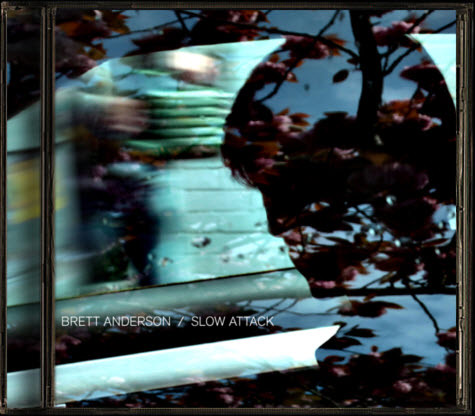
Brett Anderson has been fairly prolific since he disbanded Suede. He is currently on a self-imposed "album a year schedule." Freed from the commitment of a band and just being content to make music however it strikes his fancy, how and with whom being up to the moment, it appears he can come and go in the studio as he pleases and not contend with any democratic process. His initial reasoning for dumping Suede was that he had lost his passion for writing and was going to go out and "get his demon back." This was a rather Anderson-like announcement, the kind of "psycho for sex and glue" provocation that had made his band a tabloid darling and then quickly became the albatross by which those tabloids hung them.
Ironic, then, that this demon, as revealed on his third solo effort Slow Attack
Whatever Anderson was fumbling for on Wilderness he has now gathered together on Slow Attack. Recorded with Leo Abrahams and a collection of classical performers--cello, bassoon, French horn, clarinet, oboe, and various flutes are listed in the credits--Slow Attack has a lush, classical atmosphere. Its sound is warm and natural, more like landscape than portraiture. Though the record is dedicated to Anderson's wife, I actually hear his father in this more than anything. The famous anecdotes of Mr. Anderson Sr. involve the old cab driver alternating his son's band on the tape deck with his beloved classical music. It also shows the influence of Abrahams, a musician I was unfamiliar with but whose resume speaks volumes--Brian Eno, Bryan Ferry, Marianne Faithfull alongside dance acts like Pleasure and Ministry of Sound and popstars like Annie Lennox and Ronan Keating, a mix of Anderson's heroes and popular, commercial music. Not to mention the snippets of Abrahams' own ambient discography that can be found on his site.
The confident ear that Abrahams brings into the production booth is obvious from the opening track, "Hymn." The song starts out with a prelude of sound that is clear and distinct, warmer and more direct than on any of Anderson's previous records, achieving a beautiful dissonance before giving away to the most quiet, considered piano. "Shining through the plate glass," the opening line as much a descriptive as a lyric. By the time Anderson sings the pseudo-chorus, ""The climbing sun, the fading dawn, like a hymn to love," music and voice are in perfect unison. The aural sunrise comes full glow. I can't put my finger on what this reminds me of, some soundtrack song or other, another invocation of daybreak. It's lovely.
Brett Anderson's voice has matured beyond the nasally whine that defined his early sound. It's become a vibrant, honeyed instrument. Listen to the "oh ohhhhs" on the first single, "The Hunted
As narratives, the Slow Attack songs continue the themes that were emerging on Wilderness: love and nature. Like I mentioned, these songs are more landscapes than portraiture. Gone are the lists of crazies and beautiful ones, the city streets all but abandoned for solitary creatures more in tune with a world that existed before man. Anderson has dropped his cleverness and his obfuscation, looking to create open abstracts with more plain language (something he has been trying to do since that last Suede album, A New Morning
If there is any criticism to be leveled here, it's that Anderson is too successful at his goals. In seeking to be less obvious, he has also become less accessible. In pulling back on his persona and folding himself into the music, there is less that stands out and thus less to gravitate to. The appeal of his previous style of writing was its instant effect. Like the drugs he often referenced, the contact instantly made you high. On Slow Attack, Brett requires you to work your way into the songs. He has gotten so specific in his detail--look at the second verse of "Scarecrows and Lilacs," for instance--that listeners have to sift through it to find what makes sense again. The old Suede nonsense poetry was so bereft of meaning, it was universal, it could be anything. Here, it's just as easy to ignore what is being sung, let the voice be just another member of the orchestra. Again, what he wanted, too successful.

At the same time, Slow Attack is like a Resnais film, peopled with distant figures that are beautiful and alluring, and despite the chill, we want to understand what they are on about, where they are going, what they plan to do. "Julian's Eyes" is like following X in Last Year at Marienbad, getting the sensation directly from his mysterious brain.
Slow Attack is not a perfect album, and it may not be the masterpiece that Brett Anderson is working toward. Then again, it may. It could be one of those records that makes more sense over time, when you've listened to it so many times, you've absorbed every nook and cranny and have found all the hidden elements. It's got that lush orchestration that never stops being inviting, something akin to the Style Council's Confessions of a Pop Group
or Elvis Costello's North. I've only had about a week of listening to it, and look at how much I've got out of the disc already; imagine what I might find in a year or two.
Current Soundtrack: Slow Attack
e-mail = golightly at confessions123.com * Criterion Confessions * Live Journal Syndication * My Corporate-Owned Space * ComicSpace * Last FM * GoodReads * The Blog Roll [old version] * DVDTalk reviews * My Books On Amazon
All text (c) 2009 Jamie S. Rich


1 comment:
Great write up and think you hit the nail on the head regarding Brett's direction over the past few years.
Slow Attack is indeed a great album but I too think it will stand up more in time than the previous two.
Simon
Post a Comment